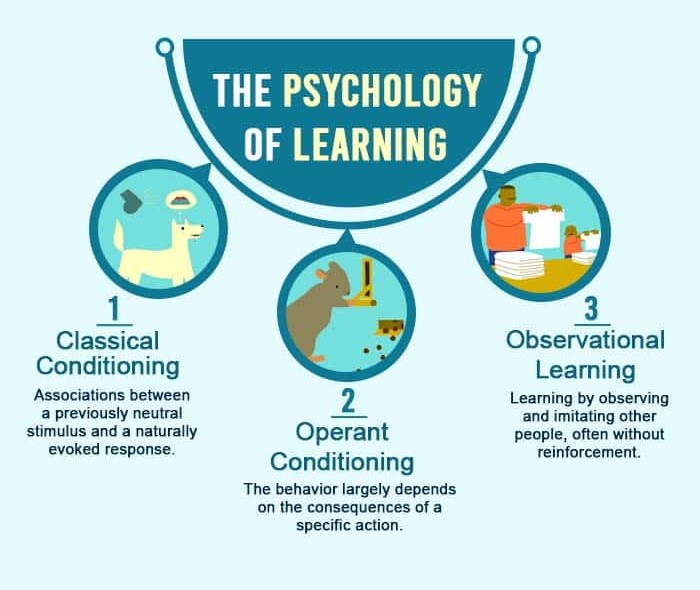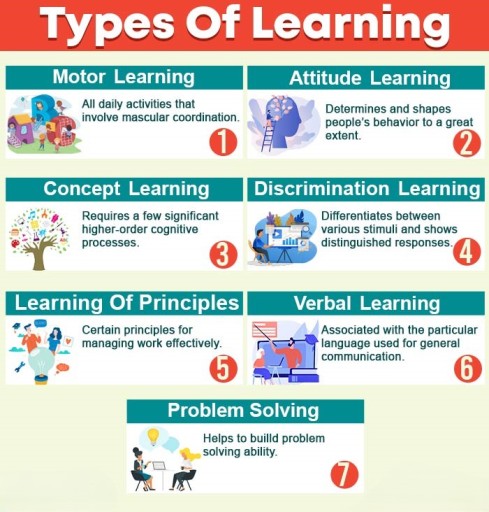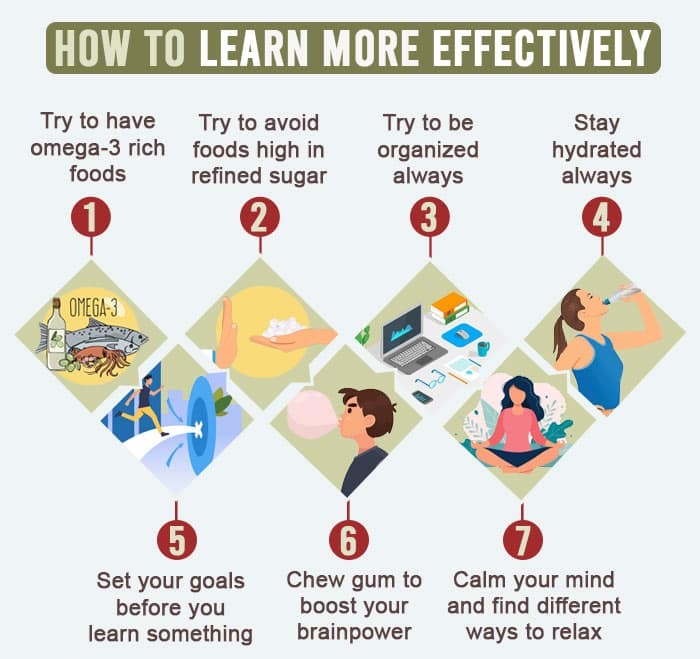Learning primarily refers to the attainment of knowledge or developmental skills through practice, study, or experience. The behavioral changes one may experience due to maturity or any illness cannot be considered as learning.
What Is Learning?
Learning is the acquisition of knowledge or habit through experience and practice. It can be described as a relatively everlasting change in the knowledge and behavioral responses that take place as a result of practice and experience. According to psychology, it is not something that one can acquire by birth and is considered a permanent or eternal change in people’s knowledge and behavior as an outcome of their experience, efforts, and practices.
We constantly interact with and are influenced by our surrounding environment. The experience we gain helps us to modify our knowledge, change our behavioral responses, and deal with the changes effectively. Thus, it is a permanent behavioral change influenced by experience. It is a process that begins with a person’s birth and ends with his/her death.
A 2013 research paper 1 De Houwer, J., Barnes-Holmes, D., & Moors, A. (2013). What is learning? On the nature and merits of a functional definition of learning. Psychonomic bulletin & review, 20(4), 631–642. https://doi.org/10.3758/s13423-013-0386-3 defines it as “changes in behavior that result from experience or mechanistically as changes in the organism that result from experience”. Learning can also be referred to as an active process of engaging different objects and experiences. Studies 2 UNDERSTANDING LEARNING. (n.d.). eGyanKosh. https://www.egyankosh.ac.in/bitstream/123456789/46577/1/Unit-1.pdf have shown that it doesn’t occur within the boundary of an educational environment rather it takes place within a complex social environment. Individuals learn or acquire knowledge by exploring the world around them, communicating with various phenomena, engaging with other people, and connecting prior understandings and new ideas.
Understanding Learning
According to a 2017 research 3 Badyal, D. K., & Singh, T. (2017). Learning Theories: The Basics to Learn in Medical Education. International journal of applied & basic medical research, 7(Suppl 1), S1–S3. https://doi.org/10.4103/ijabmr.IJABMR_385_17 , learning can be viewed as the development or behavioral modification that results from people’s practice and efforts. Individuals may learn from the changes in their existing behavior, the acquisition of new behavior, and even from the abandonment of their existing behavior. Research 4 Mandolesi, L., Polverino, A., Montuori, S., Foti, F., Ferraioli, G., Sorrentino, P., & Sorrentino, G. (2018). Effects of Physical Exercise on Cognitive Functioning and Wellbeing: Biological and Psychological Benefits. Frontiers in psychology, 9, 509. https://doi.org/10.3389/fpsyg.2018.00509 says that all kinds of learning consist of various types of mental and physical activities. The activities help a person to bring desirable constant changes in his/her behavior and attain proper growth. A 2010 study 5 Dumont, H., Istance, D., & Benavides, F. (2010). The Nature Of Learning. https://ethz.ch/content/dam/ethz/special-interest/dual/educeth-dam/documents/forschung-und-literatur/literatur-zur-lehr-und-lernforschung/aeltere-beitraege/2011_5_oecdbuch.pdf explains that the process of learning shapes the structure of our personality and experience, either directly or indirectly. It also plays a pivotal role in shaping our behavior from the very beginning.
Learning is believed to be a fundamental and eternal 6 Brem, A. K., Ran, K., & Pascual-Leone, A. (2013). Learning and memory. Handbook of clinical neurology, 116, 693–737. https://doi.org/10.1016/B978-0-444-53497-2.00055-3 process. Additionally, it is not an aimless activity, rather based on genuine purpose. But a few studies 7 Kuldas, S., Ismail, H. N., Hashim, S., & Bakar, Z. A. (2013). Unconscious learning processes: mental integration of verbal and pictorial instructional materials. SpringerPlus, 2(1), 105. https://doi.org/10.1186/2193-1801-2-105 have argued that learning can be unintended and unconscious too. The process prepares us to adjust adequately and adopt necessary environmental changes. It is not restricted to any caste, religion, gender, or culture as it is a relatively universal and continuous process. It is also a comprehensive process that covers every type of domain. The changes in behavior or knowledge don’t necessarily bring about improvement or positive development. A 2011 research paper 8 Madlung, A., Bremer, M., Himelblau, E., & Tullis, A. (2011). A study assessing the potential of negative effects in interdisciplinary math-biology instruction. CBE life sciences education, 10(1), 43–54. https://doi.org/10.1187/cbe.10-08-0102 revealed that it may also have certain negative effects on a person’s life.
Psychology Of Learning

The psychology 9 Gandhi MH, Mukherji P. Learning Theories. [Updated 2021 Jul 22]. In: StatPearls [Internet]. Treasure Island (FL): StatPearls Publishing; 2021 Jan-. Available from: https://www.ncbi.nlm.nih.gov/books/NBK562189/ of learning refers to a theoretical framework that explains a range of important topics related to how we learn things and interact with our environment. American psychologist John Broadus Watson 10 Malone J. C. (2014). Did John B. Watson Really “Found” Behaviorism?. The Behavior analyst, 37(1), 1–12. https://doi.org/10.1007/s40614-014-0004-3 claimed that all behaviors are an outcome of the learning process. Watson named this school of thought “Behaviorism 11 Danley, B., James, N., Mims, C., & Simms, A. (n.d.). Behaviorism Theory And Its Relation to Instructional Design. https://faculty.mercer.edu/codone_s/tco363/2014/behaviorism.pdf ” that divided the psychology of learning into three categories, such as:
1. Classical conditioning
It refers to the process in which we learn from certain associations between a previously neutral stimulus and a naturally evoked response. After a detailed study, Russian psychologist Ivan Pavlov 12 Rehman I, Mahabadi N, Sanvictores T, et al. Classical Conditioning. [Updated 2021 Jul 25]. In: StatPearls [Internet]. Treasure Island (FL): StatPearls Publishing; 2021 Jan-. Available from: https://www.ncbi.nlm.nih.gov/books/NBK470326/ found in one experiment that a dog salivates not only when food is presented to it but also when the person who feeds it arrives. He used to ring a bell and present food so that the dog could associate the sound with the food. He found that the dog started to salivate whenever he rang the bell and the desired response was achieved. For example, whenever we hear a familiar smartphone tone in public, we instantly check our own phones only to realize that the sound is coming from someone else’s phone.
2. Operant conditioning
A 2003 research paper 13 Staddon, J. E., & Cerutti, D. T. (2003). Operant conditioning. Annual review of psychology, 54, 115–144. https://doi.org/10.1146/annurev.psych.54.101601.145124 suggested that it is the process where the behavior largely depends on the consequences of a specific action. American psychologist Burrhus Frederic Skinner 14 Morris, E. K., Smith, N. G., & Altus, D. E. (2005). B. F. Skinner’s contributions to applied behavior analysis. The Behavior analyst, 28(2), 99–131. https://doi.org/10.1007/BF03392108 explained that behaviors followed by positive consequences are satisfying to the human body and tend to be repetitive. Similarly, the behaviors followed by unpleasant consequences tend to be less repetitive. For instance, children can be encouraged to complete their homework without any fuss if they know that they will be rewarded with candy or gifts after completion.
3. Observational learning
A 2011 study 15 Fryling, M. J., Johnston, C., & Hayes, L. J. (2011). Understanding observational learning: an interbehavioral approach. The Analysis of verbal behavior, 27(1), 191–203. https://doi.org/10.1007/BF03393102 defines this type as a process in which we learn by observing and imitating other people, often without reinforcement. According to this theory, learning includes four elements, such as motivation, memory, attention, and motor skills. For example, when a child observes his/her parents folding their clothes, he/she later tries to imitate the same.
Importance Of Learning
Learning is not limited to any specific boundary. It helps individuals to improve their ability to do something efficiently as well as to utilize the available resources in the best possible way. A 2016 study 16 Hattie, J., & Donoghue, G. M. (2016). Learning strategies: a synthesis and conceptual model. NPJ science of learning, 1, 16013. https://doi.org/10.1038/npjscilearn.2016.13 suggested that the most important benefit of the learning process is that it helps us to obtain essential skills through knowledge for achieving a specific goal. It also improves the cognitive ability 17 Leanos, S., Kurum, E., Ditta, A., Rebok, G., & Wu, R. (2018). THE IMPACT OF LEARNING MULTIPLE NEW SKILLS ON COGNITIVE DEVELOPMENT AND FUNCTIONAL INDEPENDENCE IN OLDER ADULTHOOD. Innovation in Aging, 2(Suppl 1), 1004. https://doi.org/10.1093/geroni/igy031.3708 , attitude 18 Díez-Palomar, J., García-Carrión, R., Hargreaves, L., & Vieites, M. (2020). Transforming students’ attitudes towards learning through the use of successful educational actions. PloS one, 15(10), e0240292. https://doi.org/10.1371/journal.pone.0240292 , personality, and behavioral aspects of an individual.
Research 19 Obhi, H. K., Hardy, A., & Margrett, J. A. (2021). Values of lifelong learners and their pursuits of happiness and whole-person wellness. Aging & mental health, 25(4), 672–678. https://doi.org/10.1080/13607863.2020.1711868 shows that practicing continuous learning is associated with happiness as it helps people to pursue their personal and development professional goals. These achievements are considered a great source of people’s happiness. It even promotes longevity, it helps us to maintain our brain function as we become older. A 2015 study 20 Gidicsin, C. M., Maye, J. E., Locascio, J. J., Pepin, L. C., Philiossaint, M., Becker, J. A., Younger, A. P., Dekhtyar, M., Schultz, A. P., Amariglio, R. E., Marshall, G. A., Rentz, D. M., Hedden, T., Sperling, R. A., & Johnson, K. A. (2015). Cognitive activity relates to cognitive performance but not to Alzheimer disease biomarkers. Neurology, 85(1), 48–55. https://doi.org/10.1212/WNL.0000000000001704 further shows that Alzheimer patients who practice continuous learning, develop dementia symptoms later than those patients who don’t practice.
Types Of Learning

There are seven significant types of learning that shape a person’s behavioral and personality-related aspects, such as:
1. Motor
It refers to all the activities that we perform in our day-to-day life, such as driving, walking, running, climbing, etc. Most of these activities are related to muscular coordination 21 Wolpert, D. M., & Flanagan, J. R. (2010). Motor learning. Current biology : CB, 20(11), R467–R472. https://doi.org/10.1016/j.cub.2010.04.035 and we have to learn these activities to maintain our regular life.
2. Attitude
It determines and shapes people’s behavior to a great extent. This type is a predisposition 22 Oroujlou, N., & Vahedi, M. (2011). Motivation, attitude, and language learning. CORE – Aggregating the world’s open access research papers. https://core.ac.uk/download/pdf/81147309.pdf and it is believed that all our behaviors, either positive or negative, are dependent upon our attitudes.
3. Concept
A 1995 study 23 Shimamune, S., & Malott, R. W. (1995). An analysis of concept learning: simple conceptual control and definition-based conceptual control. The Analysis of verbal behavior, 12, 67–78. https://doi.org/10.1007/BF03392898 explains that it requires a few significant higher-order cognitive processes, including thinking, intelligence, reasoning, etc. We learn most of these activities from childhood. This type involves abstraction and generalization processes. These two processes are extremely important for identifying different things.
4. Discrimination
Studies 24 TERRACE H. S. (1963). Discrimination learning with and without “errors”. Journal of the experimental analysis of behavior, 6(1), 1–27. https://doi.org/10.1901/jeab.1963.6-1 have found that this type of learning differentiates between various stimuli and shows appropriate and distinguished responses. For example, the sound of different vehicles’ horns like buses, ambulances, cars, etc.
Read More About Discrimination Here
5. Learning of principles
We learn certain principles related to science, mathematics, etc for managing our work effectively. According to a 2014 study 25 Palis, A. G., & Quiros, P. A. (2014). Adult learning principles and presentation pearls. Middle East African journal of ophthalmology, 21(2), 114–122. https://doi.org/10.4103/0974-9233.129748 , such principles explain the relationship or association between two or more concepts.
6. Verbal
It is associated with the particular language 26 Whitehead, A. N. (n.d.). Learning. NCERT. https://ncert.nic.in/ncerts/l/kepy106.pdf we speak, that we use for general communication. There are a few tools that we use in such activities, including symbols, figures, pictures, words, signs, and sounds.
7. Problem-solving
It is another type of higher-order mental process 27 Norman G. R. (1988). Problem-solving skills, solving problems and problem-based learning. Medical education, 22(4), 279–286. https://doi.org/10.1111/j.1365-2923.1988.tb00754.x as it requires thinking, generalization, reasoning, observation, and imagination. It helps people to build an ability to solve difficult problems efficiently.
How To Learn More Effectively

One cannot be an effective and efficient learner overnight. One must follow and practice certain tips and tricks to make their learning more effective. Here are some beneficial tips that can help you learn better:
- Try to add omega-3 rich foods, like salmon, spinach, broccoli, avocados, celery into your daily diet. Research 28 Robinson, J. G., Ijioma, N., & Harris, W. (2010). Omega-3 fatty acids and cognitive function in women. Women’s health (London, England), 6(1), 119–134. https://doi.org/10.2217/whe.09.75 shows that such foods can immensely help in improving your cognitive functions.
- Try to avoid foods that are high in refined sugar like doughnuts and cookies, processed foods like canned juice, and white bread. A 2019 study 29 Chong, C. P., Shahar, S., Haron, H., & Din, N. C. (2019). Habitual sugar intake and cognitive impairment among multi-ethnic Malaysian older adults. Clinical interventions in aging, 14, 1331–1342. https://doi.org/10.2147/CIA.S211534 found that habitual refined sugar intake can impair one’s learning abilities.
- Set your goals before you learn something new as it will help you to be focused on what you want to achieve.
- If feeling a little inactive, you can chew gum to boost your brainpower. Studies 30 Allen, A. P., & Smith, A. P. (2015). Chewing gum: cognitive performance, mood, well-being, and associated physiology. BioMed research international, 2015, 654806. https://doi.org/10.1155/2015/654806 show that it increases your heart rate and blood flow that makes you feel energetic and active.
- Try to be organized always. Make a to-do list before attempting something. It will help you to observe your progress also.
- Try to stay hydrated always, drink plenty of water. Dehydration 31 Zhang, N., Du, S. M., Zhang, J. F., & Ma, G. S. (2019). Effects of Dehydration and Rehydration on Cognitive Performance and Mood among Male College Students in Cangzhou, China: A Self-Controlled Trial. International journal of environmental research and public health, 16(11), 1891. https://doi.org/10.3390/ijerph16111891 may impact one’s cognitive abilities negatively.
- Calm your mind and find different ways to relax. Don’t put extreme pressure on yourself.
Improve Your Learning Abilities
Learning is a process in which our knowledge and behavioral responses change based on our practice and experience. It helps us to acquire different new skills that are important for our personal and professional growth. The process includes several physical and mental activities that cause a constant change in our behavior. Effective learning is not something that one can develop overnight. It requires enough determination and practice, one needs to follow some beneficial ways to improve their cognitive abilities.
Learning At A Glance
- Learning is a relatively everlasting change in people’s knowledge and behavioral responses as an outcome of their experiences.
- It doesn’t involve any aimless activities rather it is based on genuine purpose.
- According to behaviorism, the psychology of learning includes three types: Classical conditioning, Operant conditioning, and Observational learning.
- The process of learning can be categorized into seven different types, such as motor, attitude, concept, discrimination, learning of principles, verbal, and problem-solving.
- One can follow a few beneficial tips and tricks to improve their cognitive functioning.














